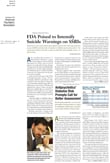Only physicians working in the neediest areas of the United States will qualify for waivers of foreign residency from the Department of Health and Human Services (HHS) under new application requirements issued in December 2003.
Under the new guidelines, which became effective in January, HHS will process J-1 visa-waiver applications only for physicians working in regions the government designates as Health Professional Shortage Areas and who score at least 14 on a 25-point scale that assesses several criteria about the area in which the physician would be practicing.
When HHS began accepting these waiver applications in June 2003, there were no score requirements. HHS suspended the program in October 2003 so it could review its policies and then reopened the program in January under the new guidelines.
Personnel from the Shortage Designations Branch within HHS’s Health Resources and Services Administration assign the scores based on a number of variables including the population-to-health-care-provider ratio, the extent of poverty in the area, and the average travel distance to reach a health care facility in the area.
In mental health shortage areas, the proportion of children and elderly people and the rates of alcohol and substance abuse are also taken into consideration.
Furthermore, HHS will accept waiver applications only from health care professionals working in certain health care centers in a particular region. Qualifying facilities are public health centers as defined by the Public Health Service Act, a rural health clinic as defined by the Social Security Act, and a Native American/Alaskan Native tribal medical facility as defined by the Indian Self-Determination and Education Assistance Act.
The U.S. Immigration and Naturalization Service requires foreign-born physicians who receive residency training in the United States to return to their countries of origin for at least two years following training before they can renew their visas. In inner cities or rural areas, however, certain agencies can request a waiver that would allow these physicians to stay in the country following residency training if they agree to practice in the underserved areas for at least three years.
According to Joyce Jones, an official with the HHS Exchange Visitor Program, the new guidelines will “target the populations and communities in greatest need.”
Jones said she doesn’t expect that the new guidelines will severely restrict the number of physicians applying for waivers. She noted, for example, that HHS had processed only 37 waiver applications since it began acting as an “interested government agency.”
But psychiatrist Godehard Oepen, M.D., chair of APA’s Committee on International Medical Graduates, disagreed.
He noted that before December 2003, there was no score requirement. As a result, the new rules “narrow down the options for international medical graduates [IMGs], who are known to provide care where American graduates don’t want to go—to rural settings, professional-shortage areas, and state hospitals,” he said.
Oepen also said that IMGs “fulfill another essential role in providing care for patients who are of racial and ethnic minorities and enrich our profession with a diversity of cultural, ethical/spiritual, and linguistic perspectives. . . .They are one of the main sources of the richness and superiority of American medicine.”
More information on U.S. Health Professional Shortage Areas, including criteria used to determine such areas and a searchable database of Health Professional Shortage Areas, is posted online at bhpr.hrsa.gov/shortage/. ▪
